What is the difference between a modern day zombie and a walking corpse from a fantasy universe? On the surface they are both undead killing machines, but the underlying mechanics of how they came to be and how they can be destroyed are very different. Modern day zombies are typically result of some sort of a plague. As such, while extremely resistant to damage, a massive trauma of the head will kill them. Fantasy zombies on the other hand are animated by evil magic (necromancy if you will) and typically can’t be killed by a head shot, and have to be dismembered. They however have another vulnerability: since they are in essence magical constructs, they have no will of their own and their ongoing existence is tied to the necromancer who have raised them from the dead. So, if you find the necromancer and kill him, his undead horde typically collapses on the spot.
I actually really like this approach. There is absolutely nothing wrong with crazy necromancer antagonists who hide behind hordes of skeleton soldiers. They make for great enemies, and unlike modern day zombie scenarios, fantasy undead invasions are typically perfectly winnable. Appearance of the walking dead in a fantasy setting immediately sets up an adventure. Genre savvy players know right away to start looking for megalomaniac wizards or mages with some deep grudge that might be behind it. It works very well.
But the entire point of this series is to switch things up, so lets see how we could spruce up the walking dead. I do not want to talk about the modern zombie outbreak in a fantasy setting type scenario though. Not because it wouldn’t be fun (I’m sure it would be a blast) but because there is just nothing to write about it. I pretty much already said all that you would need to know to run such a campaign. So let’s try a few other approaches.
Temple Sanctioned Necromancy
In most fantasy settings necromancy is considered evil and is typically forbidden or at least frowned upon by the establishment. Necromancers must practice their art in secret (at least up until they are ready to unleash their horde upon the living). It makes perfect sense – after all, what sane and well adjusted individual would want to dabble in such dark magic?
But what if it was actually sanctioned by the local religion? What if it was not only normal, but also somehow viewed as a benefit to society as a whole? Lets imagine a setting in which men worship a pantheon of 7 gods, one of which is the God of Death. This particular deity is considered the gate-keeper to the afterlife and he judges which souls are allowed to pass into the paradise, and which are to be denied entrance and destroyed. Initially the Deathgod used to destroy all wicked souls on the spot, but upon some convincing from his six brothers and sisters he eventually decided to give men a loophole. Sinners would get a chance to work off their karmic debt after death by allowing the priests to reanimate their remains so that they can be used for the good of the temple and the faithful.
Undead created this way are just as mindless as the regular ones, but instead of world domination they are used for hard labor. Essentially they are indentured slaves who never have to rest, eat or sleep and can never complain. Since corpses are a renewable resource, the Deathgod temple always has plenty of free workers they can use to get rich, or for public work projects that show their benevolence. Since the undead are mostly mindless, they typically need to be accompanied by a handler – a lower caste within the priesthood called Deathguide that does the dirty work such as patching up the undead when they get damaged, disposing of the ones that are no longer capable of working and etc. They usually wear dark robes and carry a reaper scythe as a badge of their office. They are in this sort of weird place socially: unlike priests who are venerated and respected, their job carries a certain stigma. They are kinda like morticians or graveyard keepers – they provide a vital and needed service, but it is one most people are repulsed by. That said, they do represent the temple and do have a lot of factual power. In essence they are not people you want to mess with.
People got used to this stuff and consider it to be a pretty good deal. They get to sin while they are alive and then their corpse will erase all that burden and allow them safe passage to afterlife, while at the same time providing free labor for the community. Naturally, sometimes people die in such a way that renders their body useless for reanimation. Fortunately the temple allows people to volunteer to “do time” for friends and loved ones. This system was put in place to allow people in especially dangerous lines of work (like soldiers for example) to have a reliable way of erasing their sins even if their body is destroyed. Later it became possible for one to sell their own time to someone, or purchase time from someone else.
The undead created by the priests of Deathgod are typically not used for combat, and they are mostly non-violent (though it is not uncommon for Deathguides to abuse their power and use their charges in a violent manner) and do not carry weapons. The one exception are the temple guard:
It is said that the temple guard retain some of the will and memories from their past lives, and thus they do not need a handler. They typically patrol temple grounds and act as bodyguards for the priests of the Seven. The time of a Temple Guard is seven times as valuable as that of a regular undead worker, but only select few are chosen for that prestigious position.
Optional plot twist #1: the souls of the deceased awaiting entrance to paradise are not slumbering in limbo as per temple doctrine, but are instead brought back to the physical realm via the act of reanimation. All the undead remember who they are, are aware of their condition, but are bound to the will of the Deathgod priests by magic and thus unable to do anything about it. Some within the priesthood are aware of this.
Optional plot twist #2: The Seven are actually false gods. Regardless of what constitutes a deity in your chosen fantasy system, they do not fit that description. Their priests do not actually have any divine powers – they use arcane magic to perform all their miracles. The priesthood system was set up in the ancient times in order to prevent stigmatization and persecution of magic users and to usurp political power. Old religions have been banned, and for generations all those who exhibit magical aptitude have been recruited into the priesthood, or told that their power has a divine source. This secret is only known to the inner-most circles within the priesthood and even they don’t always believe it.
Bound Knights
If you are not familiar with Warhammer 40,000, I recommend at the very least looking up the Eldar lore for an interesting twist on the Undead theme. Granted, it is a science fiction setting (well, sort-off – it’s SF in the same vein that Star Wars is SF) but I think we can still use it and transplant some of these ideas into a classic medieval heroic fantasy setting.
Anyways, Eldar are aliens who believe that their souls will be devoured by the dark gods when they die. To prevent this from happening they all wear soul stones which capture and store their souls upon death. These stones can then be plugged into the Infinity Circuits which are essentially a virtual paradises where the spirits can hang out and chill till the end of time. Unfortunately Eldar are a dwindling race, and while they are few in number they have many enemies. So sometimes they pluck their ancestors out of the Infinity Circuits and install them into war machines called Wraith Guard (essentially ghost operated power armors) or Wraith Knights (more or less Gundams piloted by a ghost). They also sometimes install them in weapons and armor to make pseudo-magical war gear.
You could essentially take all of that lore and easily implement it in any high-magic fantasy setting – spirit stones and all. Or you could just cherry pick the part about binding spirits into empty suits of armor and make your setting little bit more Fullmetal Achemist. Or twist it around again and apply it to our standard necromancer template.
Typical necromancers are primarily interested in reanimating corpses. They use the physical remains of the deceased and have not much use for their souls. But imagine a reverse necromancer who is capturing souls of mighty warriors and binding them to empty suits of armors, building a terrifying army of Wraith Knights.
Unlike typical undead, Wraith Knights are fast, intelligent and highly skilled. They have all the memories from their past life, and retain all their combat skills. Since they feel no pain, and have no vulnerable internal organs and since they are held together by magic, the only way to kill them is to smash and destroy their armor to the point where it can no longer move. This might not be an easy task considering the necromancer has more or less assembled an all star team of veteran warriors and legendary heroes. Each Wraith Knight actually follows him willingly – in exchange for their service they get a chance to settle unfinished business, seek vengeance and etc.
Yeah, I know – I just kinda re-invented the Nazgul. Shut the fuck up. It’s Fantasy, of course it’s gonna always circle back to Tolkien.
Kingdom of the Dead
One of my all time favorite “my undead are different” ideas is High Cromleh from The Scar by China Miéville. While I more or less hated Uther Doul for being an unstoppable, unfappable superhero type character, I found his back story to be fascinating. He grew up in High Cromleh which is a caste driven society ruled by mummified, sentient undead known as Thanati. They are described as liches with sewn-shut mouths, with beautiful clothes and skin like preserved leather
.
The living are a minority, who are farmed like cattle. Most are slain and re-animated as non-sentient zombies to act as servants and laborers to the Thanati. Chosen few are adopted by the undead nobles, raised as their own children and then killed, mummified and resurrected as proper Thanati when they come of age. There are few niche jobs that are consider below the nobles, but for which the zombies are too clumsy or too dumb, and thus the undead do tolerate a small number of living in their kingdom as long as they know their place.
The only social caste lower than the living, are the vampires who are considered to be the lowest of the low by the Thanati. Because the population of the free living men is so small, and because the liches guard their “cattle” jealously vampires typically live in shanty-towns on the edges of the poor districts, and take to the streets begging for food at night.
This ideas is as fascinating as it is repulsive. There is literally nothing I could add to it to make it any better. Not only does it invert the typical population rations and social positions of undead and living, it also deliciously subverts the vampire trope by turning it on its head. Since I can’t really improve upon this, here is a picture of undead nobles with crowns and shit, because pictures are cool:
This is another one of those ideas that you could just steal wholesale. It would be kinda fascinating to run a campaign in a High Cromleh style setting: especially with players who are unfamiliar with The Scar. Send them on an emissary/diplomatic style mission and see how they react when they arrive at the kingdom ruled by the dead.
The Awakened
Long, long time ago the land was cursed by a powerful and vengeful mage. To this day, anyone who dies within the borders of the kingdom without a proper burial will rise again the next day as a fully aware walking corpse. The proper burial of course involves burning of the body so that there is nothing left that could be awakened the next day. Most of the people choose to be cremated after death, because walking around in a rotting body is not particularly appealing to the living. Unfortunately, not everyone can be given a burial in time and every once in a while people wake up dead. This is especially common occurrence after battles or in places hit by a deadly plague where there is simply no time or resources to burn all the bodies in the timely manner.
What happens when you wake up the morning after you died? First you realize that the world looks entirely different. The dead have no use for eyes, ears or taste buds – in fact, these organs rot out and fall off first so they would be doubly useless to you. Instead of the five senses the living use to navigate the world, the Undead have one which they dubber Wraithsight. They are completely oblivious to tastes and smells (which is actually a blessing considering their condition) and have no sense of touch and as a result feel no pain. They however can perceive objects around them and are aware when they touch something or are being touched. They can also detect vibrations in the air, and recognize them as speech or music, thought they can’t really enjoy it the way they used to.
Wraithsight is neither sight nor hearing – it is something in-between that is very hard to explain to the living. There are no specialized organs that the undead use for Wraithsight – more or less their entire body surface is capable of detecting changes in their environment. So in essence an Awakened undead would technically have 360 degree vision. Wraithsight cannot penetrate physical objects though, so any clothing he or she is wearing will occlude their perception – which is why they still typically retain mannerisms such as turning ones face towards something they want to examine.
While most living consider underneath to be undesirable, those who become Awakened typically find their situation to be more than tolerable. It turns out that while most animal needs and urges (such as hunger, thirst, sex drive and erc..) go away after death, the self-preservation instinct perseveres. Thus most undead prefer not to throw themselves into a fire, despite the society’s insistence that they should.
Being an undead creates a lot of other problems. Since the proper thing to do is to have your body burned and ascend to an afterlife those who “wake up dead” are still legally deceased. This means that their property is divided amongst their kin and their significant others are free to re-marry. Most families consider it to be rather shameful to have an undead relative and they are typically not welcome back home. There are exceptions of course, and sometimes love and attachment are stronger than social stigma and an undead can return to their family. Some are very well cared for and preserved, but usually it comes at a cost of social status.
Most undead need to start a new life somewhere else. Some try to pass for the living at first, and while it may work for a while, sooner or later their body deteriorates to the point where they can no longer hide their true nature. Living usually get pretty upset when you deceive them about the status of your un-life and many Awakened are lynched or burned at stake when found trying to pretend to be alive. When they are open about being dead they can typically avoid lynching, though some thing that throwing stones at the undead is the only way to properly welcome them to the community.
There are few people willing to hire the dead, and if they do, they don’t pay well. On the other hand, dead don’t really have that many expenses, seeing how they never need to eat or sleep. As a result most of Awakened sooner or later gravitate towards each other and settle down in smaller or bigger communities where they can help and support each other. These dead-towns are typically well maintained, albeit very stinky places. Their inhabitants are usually friendly to any passing undead, but mistrustful of the living. Still, if you can get into their good graces, holing up in their town might not be a terrible idea – especially if you are on the run.
Every once in a while you can see one or more children living with the dead. Sometimes these are orphans that couldn’t find their place anywhere else. Other times they are relatives of one of the Awakened who is their last of kin. Most undead villages have at least one touching story about one of their own taking in a grand-grand-grand-child after its entire living family was wiped out by a plague or killed by raiders.
Those raised by the dead tend to grow up to be more tolerant and understanding of the un-death condition. Unfortunately they are few and far in between, so life of the Awakened is typically full of prejudice and hardship. Their villages are often raided by the living, or visited by all manner of priests who offer to “cure” their condition with cleansing fire. In the capitol there is even a dedicated think tank of priests and mages devoted to finding a way to lift the curse and banish all the existing undead in one fell swoop.
The Cursed Kingdom is infamous for its peculiar problem, and most citizens consider it to be deeply shameful and unfortunate. Still, despite this quirk the kingdom is actually the most prosperous and well developed nation in the area. The kings and priests claim it is because the strength of their economy as the good climate and natural riches. But the truth is that the prosperity is a direct result of the curse.
Just about every decade the population of the Ork tribes in the west swells up to the breaking point, and the horde sweeps back east across the great mountains pillaging and destroying everything in it’s path. They are savage, brutal, vicious beasts that are not easy to drive off the land once they get in. What’s worse is that Orks thrive on war so the harder you resist, the more of them come seeking a good fight. They have no fear, except one: they are absolutely mortified of the walking dead. Thirteen times the horde swept the Kingdoms of Men in the East, and each time it avoided the Cursed Kingdom. Most of the great cities in the neighboring nations have been besieged or even burned to the ground and rebuilt at least once. Most citizens of the Cursed Kingdom have never seen an Ork in their life.
—
What is your favorite unusual spin on undead in a fantasy setting? Do you have examples of books, movies or games that handle the subject in an new interesting way? Let me know in the comments.
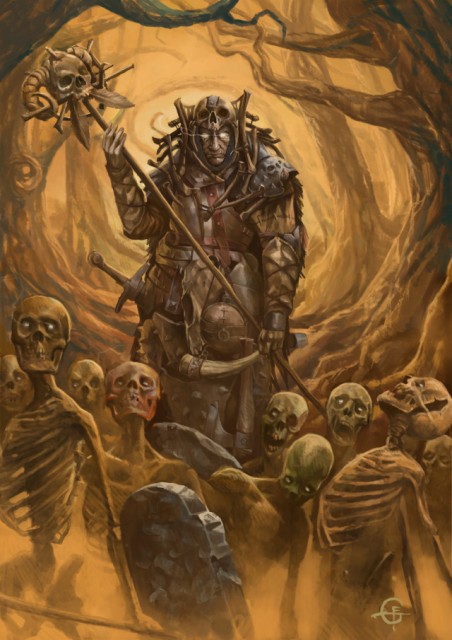


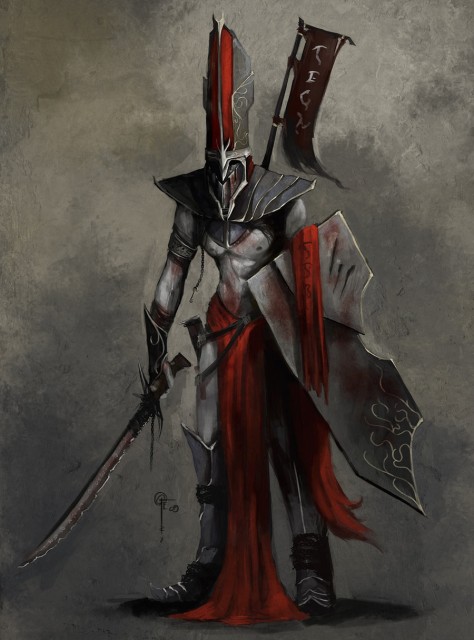
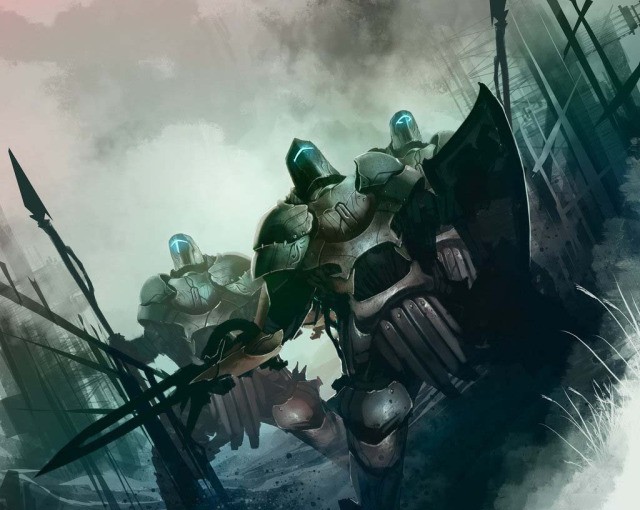

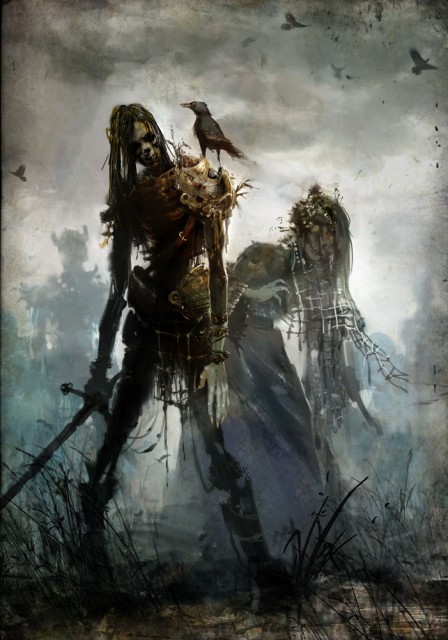


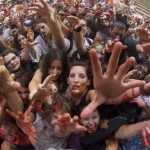
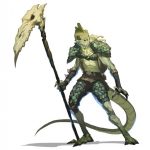
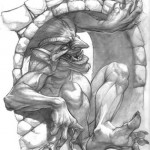
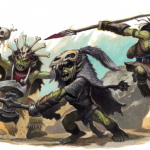

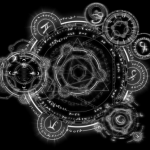
Have you seen the Tristopolis books written by John Meaney?
They have an interesting semi-modern society where necromancy is part of day to day life (their power stations generate power from the suffering of the dead). The stories are sort of noirish detective yarns, well worth a look.
This is not the first time that I mention it, but The Death Gate Cycle saga also has some interesting concepts about the undead (in fact you could find that some of them are similar to your ideas). In the universe of TDGC, there is a world called Abarrach, in which there is no life in the surface, but people lives in its insides, that are more or less as comfortable as living in a cave next to an active volcano. The situation was so bad that with the time almost everyone died. To survive, the remaining inhabitants of Abarrach perform a magic ritual that bring their people back from the death to serve as workforce, or sometimes as soldiers. The undead are obedient, but they still think that are alive and that they have things to do, so there are persons that keep them under control and “fix” them when they deteriorate to the point where they cannot perform their work anymore. One important thing is that it is imperative to wait some days (I don’t remember how many) before practicing the ritual, or other way the soul stays attached to the body and is completely conscious of what is happening. In these cases the dead are almost always vengeful, evil creatures that want every living thing to die. They also “live” in the most excruciating pain possible, so you could say that they are very similar to people working in IT support.
I love the ‘Awakened’ idea, mind if I use it in my world building?
Brainstorm while typing: combine the Awakened with the Kingdom of the Dead. To prevent overcrowding, only the nobility can choose, or grant the right to choose, to forgo cremation. Anyone of ‘lesser class’ who wishes to continue after death must serve time in the military.
I’m definitely adding this if you don’t mind!
@ Nick:
I haven’t heard of those. Sounds interesting. Thanks for the tip.
@ agn0sis:
Hmm… This scenario sounds familiar for some reason. I can swear I have seen this whole “raised from the dead too soon” thing somewhere else. Maybe I stumbled onto something that was inspired by TDGC. :P
@ Macedoneus:
Don’t mind at all – go ahead and feel free to use it. :) That’s why I post these things – when someone gets inspired I win internet points, I think. That’s how blogging works, right?
I forgot the recommendations (well, apart from the one I already talked about. From the same authors, you could try The Rose of the Prophet, with a fantasy setting completely different from Tolkien’s. Have you read the His Dark Materials trilogy? It’s awesome. I just finished Stormdancer, that is a Japanese Feudal steampunk novel. The author is very good at describing battles and the setting.
Pingback: A different Look at Undead | DisClever

in larry correia’s Grim Noir books, the undead are the souls of the recently dead, rebound by a magician to their bodies. Standard fare so far, but the dead are fully conscious and able to think and sense much like the living. Because the dead are generally dead from warfare before they are reanimated, they also tend to be in excruciating pain. This pain eventually drives them mad, and the necromancer controlling them is able to telepathically communicate to them. He generally tells them that there is a way to end their pain, and that way is to destroy whatever enemy or structure the necromancer designates for them. In truth, the only way to sever the connection between the soul and the body is the complete destruction of the body. The death of the necromancer has no effect, and, for a short time, anyone who dies near where the necromancer was raising the dead is still revived. Think of it as an area-of-effect spell. I particularly like the way this preserves the undead as a terrifying, mindless horde bent on destruction, but allows any individual undead to remain at least slightly human. There is a particularly gruesome scene in the second book that involves reanimating and interrogating an attempted presidential assassin.
MY GOD! You sir, are a genius! I just happened to stumble across this site via my ventures on the web, but I am glad I did. Not only would any of these settings make for a great pen and paper campaign, but I could see all of these worked into an amazing video game. Now I have to work on a back story for a living charter who grew up and got trained in the ways of a magic user in the “Awakened” world by a great and long dead wizard who used his un-life to become the greatest mind of magic unbeknown to the rest of the magic community.
I love these! What a great way of “recasting” a concept that is getting pretty well worn by now. While I enjoy the necromancer-flavor, you’re right–it becomes very easy to figure out how the zombies must be beaten (but pick up “Dead Beat” in the Dresden Files for one of the best iterations EVER of this).
Your post also reminds me of one of the short stories in “World’s End” Sandman by Neil Gaiman, about an air burial.
Great post, thanks!
If you’re looking for more thoughts on this, I’d recommend The Summoner by Gail Martin (first book in a trilogy). Necromancers in that series are actually good guys and fill a necessary role. In that series, they assist straggling/anguished/lost souls to the afterlife and/or maintains a legion of sentient ghosts of former soldiers to defend the kingdom but a mage decides to capture souls within the kingdom to power an artifact that will awaken an ancient god (or something, I forget the details of the bad guy’s plan).
Pingback: Necromancy ~ Author Travis Simmons
I absolutely LOVE The Awakened. So much that I had a dream centered around that idea and it was so amazing. This article has inspired me so much! Thank you for sharing!
May i recomend that you check out Erikson and his work? His T’lan Imass are a great concept you may find interesting, an entire race turned undead to fight a superior enemy
I found this post and I must commend you. It’s hard to find others who don’t immediately associate necromancy and the undead with evil. My fascination with the undead probably started when I read Sabriel, the first book in Garth Nix’s Old Kingdom series. Nix does a wonderful job recreating Death and the Undead and pulling them just ever so slightly away from the popular views of death. If you haven’t picked up the book in the year since you’ve made this post, I highly recommend you do.
I’ve always liked the idea of hoards of undead from other dimensions, planets or planes of existence… With this the rules can be changed on how to deal with them & what powers they may possess. Like the Mindolar from the Rifts game, they are not undead but alien parasites that control corpses from within.